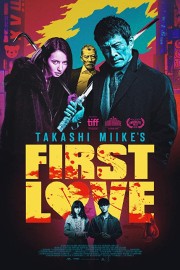First Love
I don’t really get enough Takashi Miike in my cinematic diet. The Japanese director puts out a film or two a year, but he just doesn’t really hit my radar enough, partially because I do not get out to the art house often enough. “First Love” is probably my first film of his in about a decade, and my God do I love the insanity he unleashes here. This is a sharp and entertaining crime story with a lovely little romance at the center.
Miike is a pulp filmmaker in probably the purest form working nowadays. His work is ridiculously violent and over-the-top, and his narratives are sometimes threadbare, but when they are successful, it is a mesmerizing piece of filmmaking to watch. “First Love” is a film that I’m grateful to have watched. It doesn’t have a lot to offer as a deep cinematic experience, but it’s an experience, in the best way we use that word when discussing movies. One must be in the moment at every moment in this film, and when we are, it is profoundly satisfying to watch.
“First Love” deals with a group of characters at the center- sometimes through no fault of their own- of a drug war between the Yakuza and Chinese gangs. The film begins with a hit, and a signal of escalation for the corrupt cop working the case. Our focus begins to center in, however, on a young, up-and-coming boxer (Leo, played by Masataka Kubota) who collapses in the ring, and Yuri (Sakurako Konishi), a call girl imprisoned by the Yakuza and forced to work off her father’s debt. Everything else that surrounds them builds the world Leo becomes, unwittingly, at the center of when he comes across Yuri, who is on the run from not just the gangs after the drug cutter she is kept by is killed, but also the ghost of her father, who haunts her in a very real sense. For Leo and Yuri, mortality is something that will follow them on the long night on the streets they are about to embark on.
The film begins, slowly, with its criminal world, and the stuff between the Yakuza and the Chinese is not nearly as interesting as Miike wants it to be in the first half of the film, but really, what he’s doing is setting up the stakes Leo and Yuri have for themselves in the second half of the film, when the real heart of the film comes into focus. When Leo and Yuri find themselves together, the film snaps into focus as a cacophony of chaos and action that is completely over-the-top and wild to watch, with a sweet connection that becomes the heartbeat of the film. I love the way Kubota and Konishi play these broken characters, each dealing the consequences of their lives in a way that brings us close to them, and make them great protagonists amidst the insanity around them. The film kind of reminded me of Edgar Wright’s “Baby Driver,” and like that film, it’s the full storytelling energy the director brings to the film that keeps us watching, even if it feels as though it takes a while to get going. Miike is a madman as a filmmaker; “First Love” is a fine example of him in full madness.










